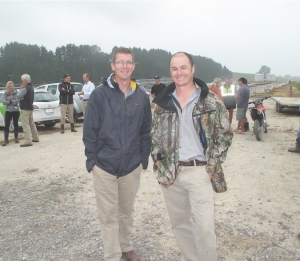The scheme was discussed at a recent ASB Bay of Plenty branch field day at Cawte Farms Ltd, near Te Puke. Visitors also saw the new dairy effluent and feed pad processing and disposal set-up on the Cawte farm.
“The money is available at 3.8%,” said ASB Bay of Plenty rural banking manager Brian Sparrow. “That is the cost to the ASB; we do not add any margin.”
The loan is available to all farmers – dairy or drystock – to a maximum of $200,000 for no longer than five years. No establishment fee is charged.
“We see farmers using the money to… fence waterways and increase effluent storage – two important steps to protect and enhance our waterways,” said ASB senior rural manager Bay of Plenty, Trevor Hurley.
Farmers also use the loans to pay for water meters, water and dairy shed system upgrades to comply with ‘variation 6’, and stock underpasses.
“I see the money also helping farmers to plan ahead – like the Cawte farm we are on today – to help future-proof their farms as increasing and changing regulations come into play,” says Hurley.
The Cawte family farm, owned by Barry and Catherine and contract-milked by son James and his partner Katie, is 185ha (eff) of rolling to steep country with another 18ha leased. They plant 53ha of maize for silage.
The farm milks 600 Friesian and Friesian-cross cows and next year will change to calving a third of the cows in autumn. The 54-bail rotary is automated and one person milks the whole herd. James employs two permanent staff.
They have recently installed a large feed pad and 39 x 6 x 2m holding bunkers for shed and feed-pad effluent with weeping walls. The green water is pumped to a holding pond 30 x 30 x 4m. This is pumped back to holding tanks for flood washing the yards, and the balance is spray irrigated on the farm. Solids from each bunker will be emptied once a year and spread on cropping paddocks.
















